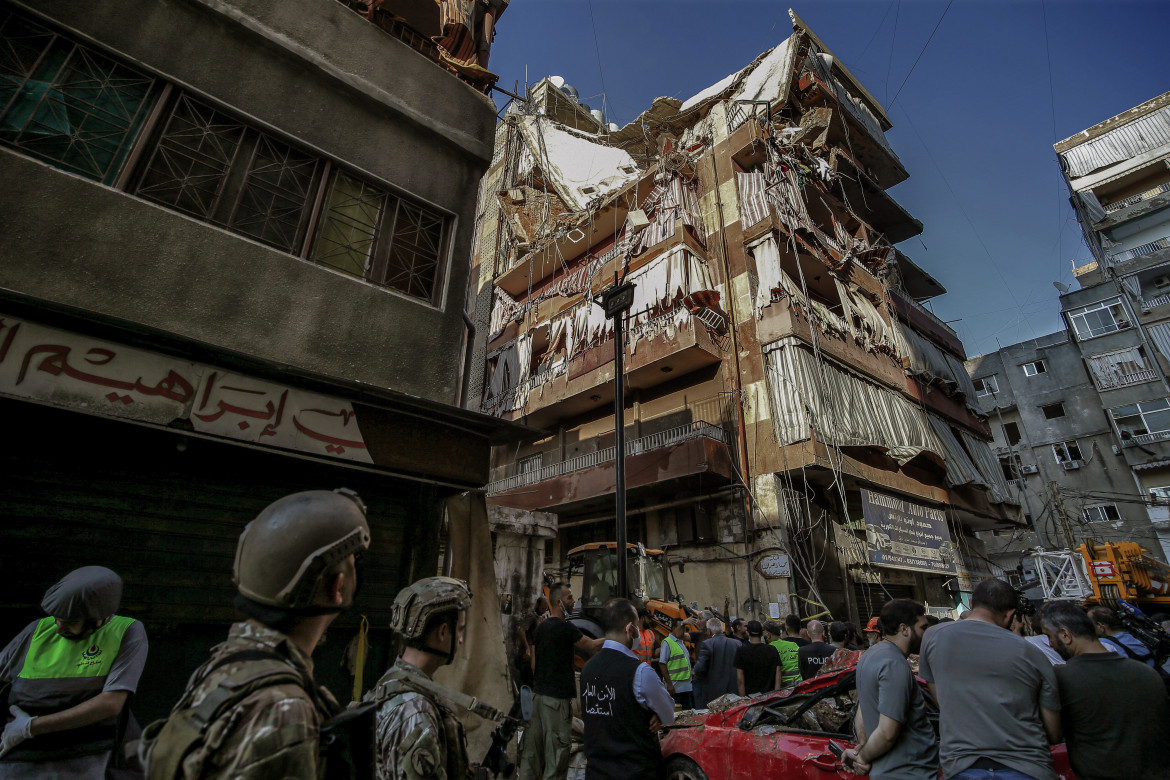Reportage
Israel escalates bombing of Lebanon and citizens are expecting the worst
Netanyahu: “I say to the people of Lebanon: Our war is not with you. Our war is with Hezbollah.” However, the dead and wounded in these two days of attacks are overwhelmingly civilians.

“We are all volunteers, we don't have any NGOs or organizations behind us. We collect water, juice, bread, cookies... In short, everything people happen to bring. We’ve organized ourselves, we have WhatsApp groups for coordination,” Hana tells us with a welcoming smile. She is in her 20s, like most of the young people who come and go from the Lycée Abdel Kader high school in Zuqaq al Blat, Beirut's predominantly Shiite neighborhood.
For just a few moments, their cheerfulness manages to drown out the catastrophe happening all around. On the upper floors of the high school are entire families who have fled, leaving their whole lives behind, without even having had a chance to fill a suitcase. “We had to leave suddenly, we didn’t take anything, not even a toothbrush or a towel,” Fatima recounts amid the ringing voices of the many children playing.
Thousands of people escaping from southern Lebanon have poured into Beirut for the most part, as well as other safer cities. Perhaps the most representative scene of the panic took place on the only highway leading from the south to Beirut, which was the scene of an enormous traffic jam on both northbound carriageways on Monday.
Shadi Jammal is with the Civil Defense, and he is working on his own, without a team, to organize initial aid at a nearby middle school: “There is no one there to coordinate operations yet. People in the neighborhood are bringing everything.” Other gathering points are more organized: the Lebanese Red Cross, municipalities, the Civil Defense, local and international NGOs have already set the relief machine in motion and their operations are in full swing.
On Tuesday, the Israeli army continued its relentless air strikes in southern and eastern Lebanon, where the Shiite presence is strongest. The provisional death toll for the Monday and Tuesday attacks has risen to 569, including 50 children, with 1,835 wounded.
“I say to the people of Lebanon: Our war is not with you. Our war is with Hezbollah,” Netanyahu said from his office in a video recorded on Tuesday. However, the dead and wounded in these two days of attacks are overwhelmingly civilians. The precision weapons Israel has at its disposal are not being used except on rare occasions, while Israel has proven just this week that it has extensive knowledge of Hezbollah, its members, and their exact movements and positions in some cases.
On Tuesday, the suburbs south of Beirut were also hit, at 3 p.m. local time. Ambulances arrived with sirens blaring for the second consecutive day. The Israeli military immediately claimed it had “eliminated Ibrahim Mohammed Kobeissi, the commander of the missile and rocket network of the Hezbollah terrorist organization.” Along with him, six other people lost their lives and 15 were wounded; we still don’t know whether they are civilians or militants.
At 7:00 p.m. on Tuesday, a new wave of Israeli air strikes hit Aramta, Bint Jbeil, Qabrikha, Tebnine, Soultaniyeh, Doueir, Kfarsir, Bayada and Braachit in the south, while in Beka'a, in the east, there was a very violent raid on Duris near Ba'albek.
Hezbollah said that it had fired 50 rockets at the Dado base opposite Bint Jbeil. More than 300 rockets were fired by the militia-party on Tuesday, a record since the beginning of the conflict – October 8, the day after Hamas attacked Israel – as the Israeli daily Haaretz pointed out.
It is feared that this air operation is a prelude to a ground invasion, although the Israeli army would run the risk of getting bogged down in a pitched battle that would certainly put it in far greater danger – just as it did in the 2006 Lebanon War.
On Tuesday, at the UN General Assembly, Israeli Ambassador to the UN Danny Danon said, “We are not eager to start any ground invasion anywhere ... As we speak there are important forces trying to come up with ideas and we are open-minded for that. … We prefer a diplomatic solution.”
Diplomatic efforts are being undertaken to tamp down the hostilities, with few results so far. Canadian Prime Minister Trudeau made a plea for de-escalation between Israel and Hezbollah, stressing his concern about the deaths of women and children in Lebanon: “We need to make sure that civilians are protected. The violence needs to stop.”
Biden is holding firm to his rhetoric of a war that began on October 7, that Israel did not want, and of Israel's right to defend itself.
At the UN General Assembly, Turkish President Erdogan accused those who continue to support Israel’s actions: “Along with children in Gaza, the United Nations system is also dying, the truth is dying, the values that the West claims to defend are dying.”
It is a time of great tension, concern and uncertainty in Lebanon. Schools will remain closed at least through the end of the week. Many airlines have canceled flights in and out of the country, and only those of the Lebanese national airline are still operating, at prohibitively high prices. All seats for this week are sold out. Embassies are urging their nationals to leave the country.
Many NGOs are sending their foreign workers back to their home countries and are limiting their movements to what is strictly necessary. Many Lebanese in the capital – at least those who can afford it – have moved away from Beirut to quieter areas. No one is harboring any illusions and everyone is expecting the worst.
Originally published at https://ilmanifesto.it/raid-e-disillusione-il-libano-pronto-al-peggio on 2024-09-25
